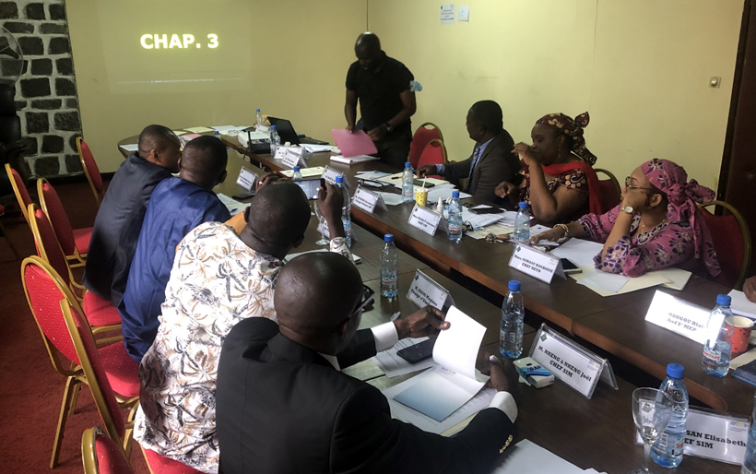Working session in the framework of the technical cooperation with the National Employment Fund (FNE) in Cameroon. Photo courtesy: FNE (SOCIEUX+ Cameroon 2019-33).
SOCIEUX+ in Cameroon: A discussion with two experts on their mission on employability and soft skills
Kito Isimba, teacher and president of a literacy training center in Brussels and Yann Guégan, lecturer and evaluator based in France, work on public policies and measures to support jobseekers, especially young people with limited qualifications. The two experts were mobilized by SOCIEUX+ to carry out a technical cooperation mission with the National Employment Fund (FNE) of Cameroon, the institution in charge of supporting jobseekers throughout the country. In this interview they give us their impressions of the recent collaboration.
This was the first time you worked with SOCIEUX+; what can you say about working with the Facility and its methodology?
Yann Guégan: After several years working in the field of international cooperation, I had not yet had the opportunity to work with SOCIEUX+, so this experience was a first in my professional career. What interested me most in carrying out this activity was above all the spirit of the Facility; the exchange of practices and cooperation between peers in public action leading to a strengthening of the partners’ capacities in a co-construction approach.
Kito Isimba: For my part, this was also my first experience working with SOCIEUX+. I remember it as a very rich experience on a human level. The smooth operation of our mission was due to the intense and fruitful collaboration with the representatives of our partner, FNE. Everything was done to ensure that we worked in the best possible conditions. This created a particularly pleasant working dynamic.
What was the objective of the mission?
Y.G.: The two objectives of the assignment were to design a training, based on a prior examination of the conditions, that would improve knowledge of soft skills (behavioral skills) integration for jobseekers, and would also teach the training activities to the employment professionals of FNE. This was designed to be a training-of-trainers course, where the first group of trainees will be able to teach it to others.
K.I.: Our mission was the second part of an action whose first activity was launched by other experts remotely, given the circumstances of COVID-19. One of the key points of our mission was to carry out our mission face-to-face. This led us to travel to Cameroon.
What are soft skills, why are they relevant and how can they contribute to the employability of jobseekers in the most vulnerable sectors?
Y.G.: If soft skills are the subject of so much attention from employers these days, it is because technical skills alone are no longer sufficient to successfully perform in a professional workspace. The current social evolution, through the constant transformations that are taking place in the professional world, has forced companies to adapt permanently. In addition to being able to rely solely on new technologies, knowledge, and know-how (in other words, technical skills), companies have become aware of the importance of human capital and professional skills, also called soft skills.
K.I.: Addressing the issue of soft skills makes it possible to understand that the professional profile of a worker (either an employee or self-employed) is not limited solely to technical skills, and that these cannot be considered without soft skills. Technical skills evolve very quickly in many sectors. The ability to stay up to date, and therefore to adapt, is essentially based on soft skills. In particularly competitive environments, companies are very attentive to soft skills, particularly when recruiting workers.
What specific aspects were worked on in the framework of this mission? What was of most interest to the participants?
Y.G.: In carrying out this mission we were keen, together with FNE, to question the practices and tools used to support jobseekers, to determine whether soft skills are currently being taken into consideration by employment advisers. We also shared the importance of soft skills in society as well as the performance of companies, then discussed the methods and tools to identify, measure, and value the soft skills of jobseekers.
K.I.: In addition, we shared existing good practices of soft skills usage among FNE professionals, which are often carried out unconsciously. This helped reinforce their understanding about the integration of support skills, particularly for the most vulnerable job seekers (young people in fragile situations, refugees, women, etc.).
Beyond what has just been mentioned, the collegiality of the project teams at FNE and SOCIEUX+ were essential both for the successful conduct of our mission and the accurate identification of FNE’s training needs. The relationship factor between stakeholders is essential for the development of a project, from its conception to its implementation. It often determines whether the objectives are achieved.
(SOCIEUX+ Cameroon 2019-33).


Awarding diplomas at the end of the training, in the framework of the technical cooperation with the National Employment Fund (FNE) in Cameroon. Photo courtesy: FNE (SOCIEUX+ 2019-33).







